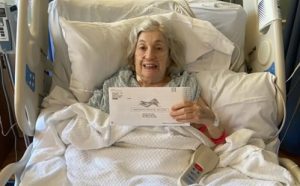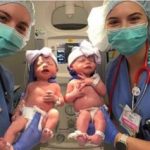Nurses Deliver Babies, Patients’ Ballots
 The day before the 2016 election, a pregnant woman’s water broke earlier than planned. She rushed to a Manhattan hospital, with more than the new baby on her mind. “She said, ‘The election’s tomorrow and I need to vote, what am I going to do?'” recalls obstetrics nurse navigator Lisa Schavrien.
The day before the 2016 election, a pregnant woman’s water broke earlier than planned. She rushed to a Manhattan hospital, with more than the new baby on her mind. “She said, ‘The election’s tomorrow and I need to vote, what am I going to do?'” recalls obstetrics nurse navigator Lisa Schavrien.
Schavrien was determined to perform a delivery — of a ballot, that is — right to the patient’s bedside.
“She’s having a baby and she’s thinking about voting,” Schavrien, now 47, tells PEOPLE. “This is obviously very important to her.”
Schavrien scrambled to secure an absentee ballot, whisked it back to the hospital where the patient filled it in, then delivered it to a polling place — a day-long journey involving two round trips to Staten Island, where the patient lived.
The experience made Schavrien and her colleague Erin Ainslie Smith, who work at Lenox Hill Hospital in Manhattan, realize that hundreds of patients who unexpectedly end up hospitalized close to Election Day may also want to vote, but don’t have the opportunity.
“Every patient should have the right to vote if they choose,” Schavrien says.
By the 2018 midterm elections Schavrien and Smith had created a unique program called Vote North (named for Northwell Health, which runs their medical center) to help patients across the entire 400-bed hospital to vote from their hospital rooms.
“Just because you’re in a hospital doesn’t mean you don’t count,” Smith, 41, says. “So giving patients the right to do what they already have earned the right to do is really important to me.”
And it’s much needed. In 2020, 124 of the hospital’s approximately 300 patients voted from their bedsides; another 125 patients in four of the healthcare system’s other hospitals also voted.
Patients are elated that their votes counted.
“It was fantastic, it was the most normal thing I got to do between almost getting my leg amputated and them saving my life,” says Brad Fischer, 60, who was hospitalized at Lenox Hill during the 2020 election. “It’s great that they do this.”
With another Election Day approaching on Nov. 8, Schavrien and Smith — with the help of other nurses — are going full steam ahead.
Their plan is to distribute voting information on every patient’s meal tray the Sunday of election week. If a patient wants to vote, they can fill out an absentee application on Monday, Nov. 7, then a volunteer will deliver it to the patient’s board of elections and pick up their ballot. Patients fill out their ballots in bed, and volunteers schlep them back to patients’ county board of elections or polling place.
In the past, volunteers have traveled across all five boroughs of New York City to get the job done — and forayed to counties outside the city well over an hour away.
If someone is admitted to the hospital after 3 p.m. on the Monday before Election Day, Schavrien and Smith are required to obtain court orders to secure patient ballots.
“Lisa doesn’t know the word no,” Smith says of her colleague’s dogged determination to make sure all patients can vote. “Tell her no, and that is the wrong answer. She will find the yes.”
The duo has been spreading the word across the U.S. to other hospitals. “On any given day in this country there are approximately 600,000 people in a hospital bed,” says Smith. “That’s potentially 600,000 people who did not get a chance to vote.”
But due largely to onerous absentee voting regulations nationwide, the pair know of just two hospitals, in Michigan and Georgia, which now offer a similar program.
“Obviously we feel very passionately about it,” says Smith. “And our patients feel very passionately.”
She recalls the first patient she told about the fledgling program in 2018. The woman had a brain tumor and was trying to figure out to vote.
“The patient said to me, ‘I told my family they can’t cut into my head on Tuesday until I voted,'” Smith recalls. “That just validated to me how important this.”
(This story originally appeared in Yahoo! Entertainment.)




